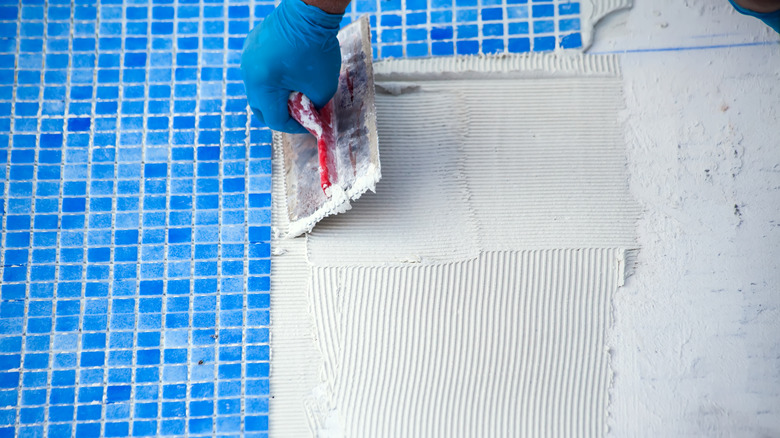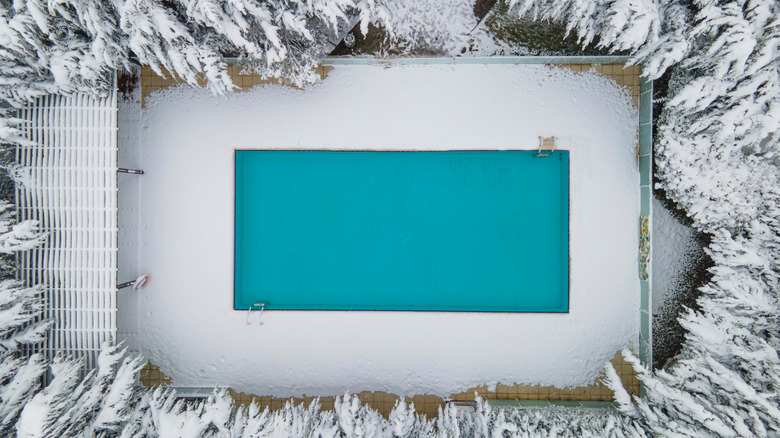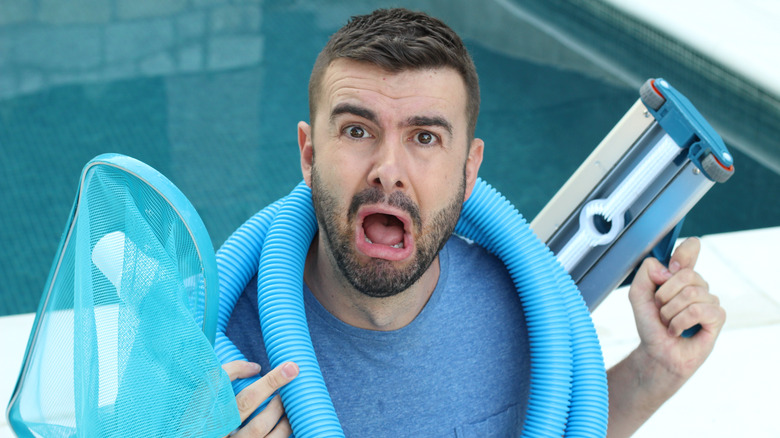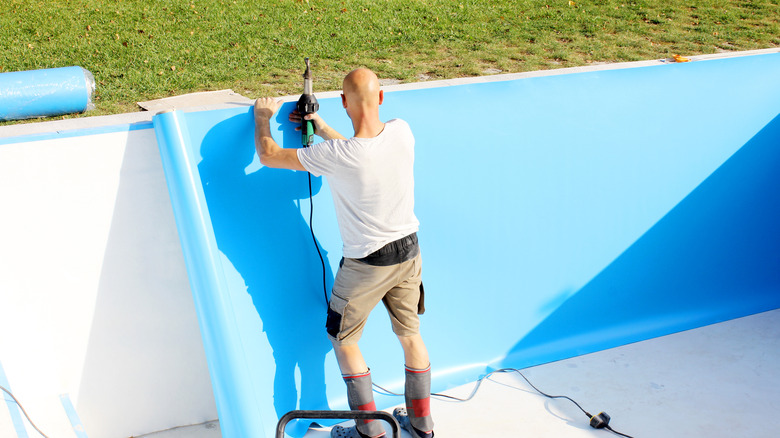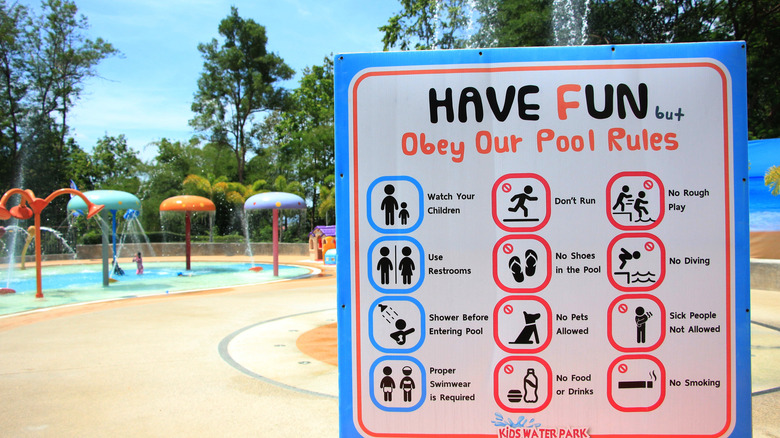How Much Does It Cost To DIY An Inground Pool?
Building yourself a swimming pool is a fantastic way to relax and enjoy the water from the comfort of your own home. Professionally installed in-ground pools can range from a 9-foot swim spa to an Olympic size lap pool over 25 feet long. Still, according to Bob Vila, the average homeowner will pick something more moderate with a shallow end and a deep end for diving. In-ground pools, of course, differ from their above-ground counterparts although both may be considered permanent home features.
Pools are usually made out of vinyl, concrete, or fiberglass. Generally, the cost is based more on size than shape, although Happy DIY Home notes that custom shapes can significantly increase the total costs. The average DIYer will typically choose a material that fits their needs or order a custom pool installation kit. Costs range from around $12,000 for a smaller pool (about 10 feet long), to as high as $100,000 for a fully customized one. Unlike many other home features, there are some variables in how much a pool will cost to build, including location, liability, and what it's built from — so it's wise to do your research before beginning construction.
Factors that affect the cost of building an inground pool
As with any project, DIY installations vs professional installations vary greatly in cost. In addition, extra features such as diving boards, heating systems, sunbathing areas, or access steps will all increase the budget considerably.
Cost by installation
Home Advisor explains that many DIY installations can save as much as 50% off the cost of a professional installation, with some people creating inground pools for as little as $1000. It should be mentioned, though, that errors in pool construction can become costly very fast. Material costs tend to follow the same trends as the overall cost of different pool types with concrete being the most expensive. Even a modest pool that is made from concrete will start at around $35,000, whereas, a vinyl installation will cost around 1/2 that. Using a fiberglass shell is a good middle ground as it's cheaper than concrete and is usually pre-made to specific sizes, meaning it can be delivered to your home and installed relatively quickly, according to Happy DIY Home.
Cost by location
Geographic locations make a big difference in pricing as well. Labor costs tend to be higher in urban areas, yet materials may be more scarce or incur higher delivery costs, mentions New Home Source. A qualified builder should also understand the climate in the area where you intend to build a pool, for instance, does a significant portion of the year have freezing temperatures, or is the yard is prone to flooding. Geographical concerns and difficult environments will often necessitate an increase in the construction price.
Additional costs for building an inground pool
Before deciding to start construction, however, there are some additional costs to remember. Annual, monthly, and weekly maintenance fees can quickly build up and need to be budgeted for.
Costs of professional maintenance
Bob Vila describes professional pool maintenance costs as averaging between $1,000 and $3,000 a year depending on the size of the pool, the filtration method, and the service provider. In addition to maintaining the filters, you will also need to factor in costs for seasonal cleaning, algae removal, liner and surface repairs, and also maintenance of any pool decking or surrounding surface areas. HomeGuide estimates these annual costs to be even higher, at around $3,000 to $5,000.
Costs of DIY maintenance
Taking care of your own pool maintenance can provide significant savings. As Kompareit states, the cost of simply closing a pool for winter can run between $150 and $500 yearly. While it is cost-effective for pool owners to do their own seasonal opening and closing maintenance, it should be noted that doing this incorrectly can cause far greater costs in damages than would be saved if something goes wrong.
Cost of pool utilities
Utilities also play a significant factor, with the cost of water and electricity varying greatly depending on location. Momentum Pools estimate that typical running costs vary from $3 to $6 per day for electricity (depending on your pump and chlorinator setup), and between $20 and $80 per year for water.
Types of inground swimming pools
Non-traditional pools
There is more than one kind of inground swimming pool. For the innovative DIYer, there is the option to use non-traditional materials such as cinder blocks, plastic liners, nature-based products, or even convert an above-ground pool, according to DIY & Crafts. The price for this type of installation will vary as widely as the ideas themselves.
Traditional designs
If you plan on self-installing a more traditional pool, be it from cement, fiberglass, or vinyl, it is common still to have some level of professional support for certain steps, notes The Spruce. Concrete pools use specialized types of concrete to line the bed (shotcrete in wet applications and gunite in dry applications), which are both highly durable. Fiberglass pools use a pre-built liner to form the pool opening, however, this may require professional equipment like a crane. Installing a Pool with a vinyl liner is a lot like building an above-ground pool frame and dropping it into a pre-formed hole with sand or rocks forming the base. Pool types and designs will additionally vary depending on your choice of water heating and filtration systems.
Why should build an inground swimming pool
There are many reasons to build an inground swimming pool in your yard. It provides wholesome entertainment for your family and friends, increases the value of your property, and offers a number of health and financial benefits, too.
Entertainment and cost benefits of inground pools
Statista describes the average amount that a family with one child would spend to visit a public swimming pool as $786 annually. Of that cost, $388 is the amount simply spent traveling between the pool and home. When one adds more family members and additional years, those costs can quickly add up, making your own swimming pool an economic alternative.
Health benefits of inground pools
In addition, having your own swimming pool can promote health and happiness. Pool owners have reported a renewed enjoyment of home vacations (staycations) during the past few years, notes River Pool. Parents often comment that their children are less stressed and have an easier bedtime routine when they enjoy regular physical activity. MyMove adds that adults can also benefit from this type of low-impact exercise, both physically and mentally. In addition, many homeowners enjoy control over the water quality and filtration methods in their own pools, without concerns about the high levels of chlorine or pollutants that occur in community pools.
Benefits and risks of an inground swimming pool
When considering the benefits of an inground pool you should also think twice about the associated risks. Additionally, Lemonade reminds potential pool owners not to forget the costs to insure their pool for both damage and liability.
Liability of inground pools
Your homeowner's insurance will likely add about $50 a year to your premium for the additional damage protection on your coverage, according to Value Penguin. This value may increase significantly depending on whether the pool is considered a part of the house or a separate structure, should you need to make a claim for damages. If a pool were to leak, potential damages could get costly very quickly. The liability portion of the cost may vary more greatly, depending on your location and other factors such as whether you are required by city codes to pay for and install a fence around your pool. After reviewing several different quotes for a $200,000 house with a pool, U.S. News did conclude that Allstate had the most affordable policies of those reviewed.
ROI of inground pools
Home Advisor additionally notes that adding a pool will achieve a return on investment of about 7 percent. For some homeowners, this projection isn't worthwhile, but for others, it's simply the icing on the cake, making pool choices a very personal decision. In short, if it will save you entertainment costs and bring your household joy — building a DIY inground pool is an excellent choice. If you are adding a pool as a home value investment, you may want to reconsider.
